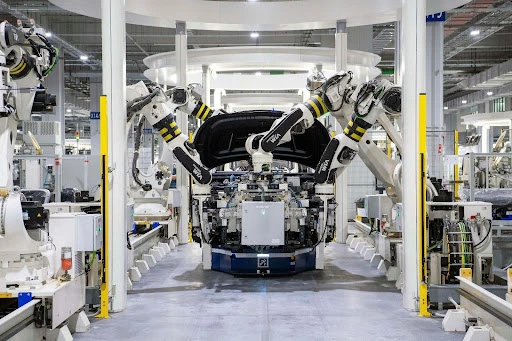Technology and defense have always gone hand in hand. With the game-changing AI advances of recent years, AI in the defense sector is no longer a “nice to have,” but a true essential. As defense systems get smarter, faster, and more effective than ever before, considering how AI for defense fits into your organization’s strategy is essential for those working in the sector.
What Is AI in Defense?
AI systems today are a viable partner in military and security ops. They can learn and even make decisions, using carefully curated data sets and algorithmic instructions. Put simply, this means these systems spot patterns and analyze data, and can use that to make predictions about what may happen next.
This doesn’t sound that important at first. After all, automation in defense organizations is hardly new! However, that’s like comparing a calculator with the student behind it. One just solves problems. The other can learn math concepts and problem-solve on their own. While we haven’t (yet) reached a point where AI can be fully trusted with independent defense decisions, this is a critical difference. Instead of just following instructions, AI for defense can actively improve over time as more information is assembled and the algorithm “learns” what to do with it.
AI in the defense industry has massive implications across:
- Cybersecurity,
- Network defense,
- Intelligence, surveillance, and recon ops,
- Strategic decision-making,
- Logistics and supply chain management, and
- Training and simulation
As the technology improves, we can even build toward fully autonomous weapons systems. We’ve already seen amazing inroads into this with technology like autonomous drones.
How AI in the Defense Sector Is Changing Security

Let’s take a closer look at some of the key areas where AI for defense shines.
Better Intelligence Analysis
The defense sector has always faced challenges in sorting through the huge amount of information collected. Security teams bring together data from satellites, drones, social media, traditional media— there are almost no limits. Parts of this information could be critical— but first, you’ve got to know it’s there. And the sheer volume is simply too much for humans to review. This can introduce weakness or mean critical information is missed.
AI helps by quickly scanning this information and highlighting what matters. For example, AI may review thousands of bytes of satellite image data. It can spot important changes, like new buildings or vehicles in sensitive areas. It then highlights this for the human operator to evaluate.
This helps defense teams focus on real threats or important changes instead of wasting time crunching irrelevant data. In the above example, it may present 10 images where significant changes happened. That’s a whole lot less than the 1,000s of images that may have initially been gathered.
Improved Decision Making
Improved decision-making goes hand in hand with better intelligence analysis. Military commanders need to make quick decisions based on complex situations. AI defense systems can help by:
- Suggesting possible courses of action
- Predicting likely outcomes of different strategies
- Updating recommendations in near real-time as conditions change
Of course, this doesn’t replace human judgment. It simply makes sure leaders have better information to work with.
Autonomous Systems
The logical outcome for AI in defense is fully autonomous systems. We’ll likely see major advances in this area in the future. Today, AI in the defense industry is already powering a new generation of systems that can operate with less human control. These include:
- Drones: Small aircraft that can fly planned routes and gather information. Advanced models can even adjust their flight according to what they “see”.
- Ground Robots: Machines that can move through dangerous areas to check for threats or deliver supplies without putting people at risk.
- Maritime Systems: Underwater vehicles that can patrol harbors or search for mines without a human pilot.
By taking over these potentially dangerous tasks, AI for defense helps to keep military and security personnel safer.
Cybersecurity Protection
Today’s defense sector isn’t just about physical threats, either. We collectively have a frightening amount of data freely available across the web. Almost 149 zettabytes of it and rising! Bad actors are always happy to steal it, be it for political or personal gain. Countries and organizations need to protect their computer networks and digital infrastructure the same way they protect their borders.
AI defence systems help by:
- Checking unusual activity. This could signal incoming attacks.
- Responding to threats in real-time. This means faster than human operators can.
- Detecting (and even fixing) weaknesses before they are exploited.
This is especially important as more critical systems become connected to networks. The World Economic Forum Global Risks Perception Survey ranks “information and disinformation” as the very most important risk area currently. Direct cybersecurity threats follow in position 4, with only social and climate risks surpassing it.
AI in the Defense Sector: Rising Benefits for Security Organizations
Whether you already are working with defense agencies, or are thinking about entering this market, understanding the evolving role of AI in the defense sector is crucial. Here’s why:
Growing Market Opportunities
Defense departments and private security companies worldwide are investing heavily in AI for defense. The US Department of Defense alone has requested billions of dollars for AI-related projects. This creates opportunities for businesses that can provide (and understand):
- AI software solutions
- Hardware designed for AI applications
- Training and implementation services
- Ongoing support and updates
It also means that defense organizations who aren’t considering how AI defense systems will change the threat landscape will be left vulnerable.
Competitive Advantages
It may seem odd to think of something as mundane and business-like as “competitive advantage” in the defense sector. However, companies that understand how to use AI for defense have a major advantage. And those that don’t yet have this in place need to modernize their capabilities— fast. It’s not just a case of “standing out from your competitors.” Failing to adapt to changing technology leaves you at risk and exposed. You can be sure your competitors— from other organizations right through to governments— are already moving.
Long-term Relationships
Defense contracts are usually long-term relationships. Once an AI defense solution is integrated into a system, agencies will need ongoing support, updates, and new features. Technology in the defense sector simply can’t be allowed to go stale. This means a host of new roles and supporting jobs will be required.
Key Challenges for AI in the Defense Sector

These developing opportunities for AI in the defense industry aren’t without their own challenges, of course, namely:
- Technical Hurdles: Defense AI systems need to be extremely reliable. They often operate in environments with limited connectivity, harsh conditions, and high stakes. AI for defense needs to work reliably, even when conditions aren’t perfect. Lives may literally depend on it.
- Security Needs: AI in the defense industry may be novel and exciting. That doesn’t mean it can bypass the strict security standards in the industry. AI defense systems must be subject to the same due diligence as any other technology.
- Ethical Considerations: AI in defense also raises important ethical questions, especially around autonomous systems that might make life-or-death decisions. When embracing AI in defense, we must also have a clear position on these issues and be prepared to discuss them with stakeholders and the public.
Embrace the Future of AI in Defense
AI in defense will only grow in the coming years. As the new technology refines itself, we expect to see advances such as:
- More integration between different AI systems
- Greater autonomy for machines in limited contexts
- Better human-machine teaming, where AI and people work together more effectively
- More focus on explaining how AI reaches its conclusions, which is crucial for trust
AI in the defense sector has already transformed how security operations around the world work. It has brought amazing potential to the table but isn’t without its hurdles. However, this is one of the most exciting advancements we’ve seen in recent years. The potential for enhancing security and making the world a safer place is massive.
If you’re ready to embrace everything AI in defense can do to contribute to important security missions while also growing your organization, feel free to reach out to our team today. We’re always available to help you make the most of AI in the defense sector.
Recent Posts
-
Published on: July 8, 2025
-
Published on: July 1, 2025
-
Published on: June 24, 2025






